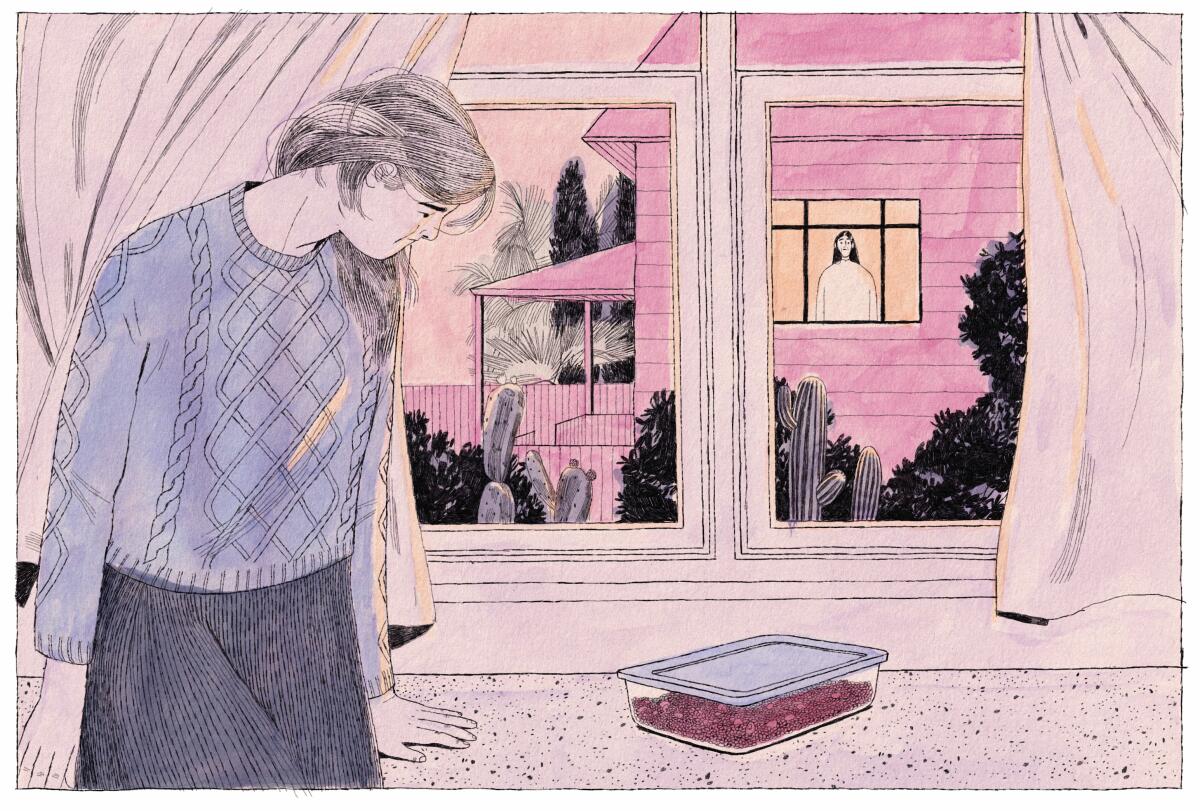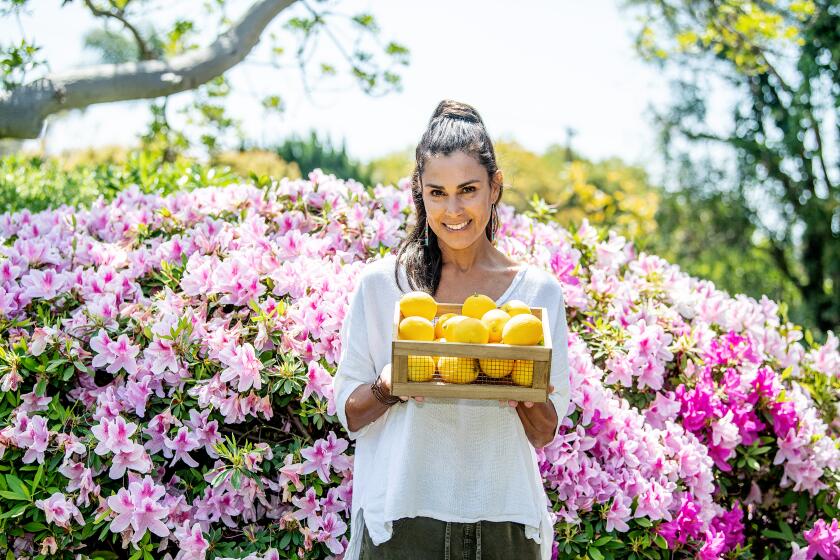Op-Ed: Amid cancer and the coronavirus, it was leftovers that forged our friendship

- Share via
My husband occasionally roots through our freezer and pulls out forgotten items, giving me a “can we please throw this away” look.
This time the container read “Lentil Surprise” in my neighbor Keren’s cheerful handwriting.
Keren and her family lived two doors up. Four years ago, she was diagnosed with leukemia. A bone marrow transplant from her sister that year seemed to work the needed miracle, but she dealt with side effects from radiation, chemotherapy and the immune-suppressing drugs that kept her from rejecting the transplant.
Keren’s husband, Mike, had his own autoimmune issues and had turned to a vegan diet low in oils, salt and sugar to help control his symptoms. Their daughter Ariella, who was 7 when Keren was first diagnosed, was a picky eater.
Keren loved good food, but she was often exhausted and money was tight, so takeout wasn’t a frequent option. Trying to meet everyone’s dietary restrictions often left her nibbling chicken fingers or raw veggies for dinner. “I can’t cook three different meals,” she’d lament.
Soon thereafter, I texted her that I’d made a cauliflower feta frittata. It was warm. Could I bring her some?
Next week my husband made spanakopita. Would she like a piece?
Soon we were regularly trotting over with entrees for Keren.
Then Keren asked if I wanted some old veggies and freezer-burned chicken they were throwing out.
I did.
A chicken and veggie pasta soon bounced back to Keren and provided our own dinner. It didn’t suit the vegan or the picky eater, but Keren loved it.
I couldn’t heal Keren. But sharing our food with her felt primal and life-affirming. With each bite, I imagined her growing stronger. I had to imagine it because once COVID-19 hit, we ate at separate tables two houses apart. I’d see the three of them at dusk moving like slender masked ghosts on neighborhood walks. I’d place food on their porch, ring the bell, then retreat 20 feet. They’d open the door in their N95 masks and we’d shout out conversations.
She used to joke that I could “Iron Chef” any leftovers in her fridge. My attempts with Keren’s celery failed, partly due to my own distaste for it, but I gave it to my sister who found success with it in her home. Zero waste!
Food insecurity continues to dominate the lives of millions of Americans, and hyperlocal apps and online groups are popping up to help fill some of the gaps.
Keren was homebound long before COVID, but she was a lively correspondent. I was only one of the many helpers after her illness descended, but proximity made it easy to lend a hand.
For four years our culinary highway was in full swing, with plates of food, raw materials and compost donations (Keren was an avid composter) flying back and forth in a series of insane Tupperware exchanges. She even saved scraps for our dog and dropped off teas and jarred sauces that her family rejected. Now I realize she was cleaning house so Mike wouldn’t have to deal with it when she was gone.
On good days, Keren cooked up a storm. Some endeavors succeeded wildly, like a vegan chocolate cake. Others not so much.
“Mike won’t eat it anymore,” she’d say, offering me a tub of vegan stew, “Feel free to toss, but I can’t bear to throw it out.”
The addition of oil, salt, spices and alliums — which Mike’s diet severely limited — were all Keren’s dishes usually needed for my palate. But Lentil Surprise stumped me. Envisioning a vegan meatloaf, she’d added a lot of ketchup. The dish was sweet and bland. I shoved it into the freezer and forgot about it.
Hanukkah and Christmas 2020 came and went, with holiday cookies chugging back and forth. Keren was thinner and visibly strained.
It wasn’t clear whether Keren’s immunocompromised system would be too frail for a COVID vaccine. She was in and out of the hospital for tests, and it made her cry when staffers didn’t wear masks or slung them below their noses.
Late last year, Keren no longer had the energy to tend the compost bin. I wish I could say that I took it over, but I was too busy.
Then came the day Keren called me from her car. The cancer had returned.
Within two weeks, she was gone.
The food highway was no more.
And in my grief, I was left with bottled condiments and Lentil Surprise.
“Just throw it away,” my husband said sensibly.
I couldn’t. Even though Keren would have laughingly told me to dump it, salvaging it was my way to honor the culinary friendship we’d forged.
I was on a mission. First, I cooked more lentils. Then I sautéed aromatics and spices and added tomatoes to make a masala, a nod to Keren’s South Indian ancestry.
I mixed everything with Lentil Surprise and served it over brown rice. Only for myself — my family wanted nothing to do with this experiment.
It was still sweet. But with every bite, I remembered meals Keren and I had shared and our zealous two-woman crusade against waste. And how, with almost everything I’ve cooked in the last four years, I’ve thought, I’ll bring some to Keren.
When I washed out the container, I considered leaving Keren’s handwritten label intact. But fearing it would cause Mike pain, I peeled it off and threw it away.
Then I filled the container with watermelon, walked up two houses and rang the bell.
Denise Hamilton, a former reporter at the Los Angeles Times, is a native Angeleno, a novelist and a Fulbright scholar.
More to Read
A cure for the common opinion
Get thought-provoking perspectives with our weekly newsletter.
You may occasionally receive promotional content from the Los Angeles Times.











